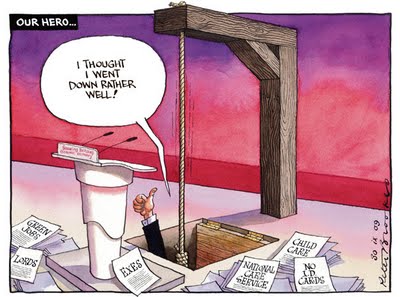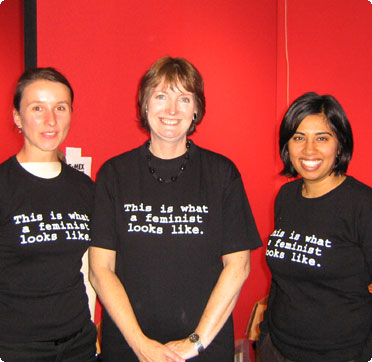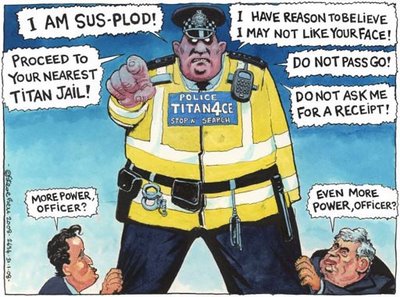The electoral war over crime.
The closest we've probably come has been the Tory insistence on using statistics on violent crime which are strictly non-comparable. This started when Tory candidates were sent information from Conservative Central Office which compared the number of recorded violence against the person stats of a decade ago with those of 2008-09. These packs failed to make clear that the way the police recorded violent crime changed in 2002 - whereas then the police decided what was and what wasn't a violent crime, which led to accusations that they were fiddling the figures, this was changed to the victim deciding whether or not the incident they were subject to was a violent offence. This, predictably, has led to a huge inflation in the number of recorded violent offences, as any such subjective change is likely to. According to the stats given to the local media by Tory MP Mark Lancaster, there had been a 236% rise in violence against the person in Milton Keynes, going from 1,790 offences in 1999-2000 to a staggering 6,015 in 2008-2009, or as Mark Easton noted, a violent attack every 90 minutes. Thames Valley police themselves objected to this crude comparison, pointing out that the figures were now incomparable, as well as illustrating how the change in recording has ludicrously boosted the figures: they judged that there had been just 81 victims of serious violence in MK, with around 2,000 victims of low-level assaults where a minor injury had occurred, while the violence against the person stats quoted by Lancaster included a dog being out of control in a public area.
Despite a reprimand from the UK Statistics Authority that using incomparable statistics in such a way was "likely to mislead the public", the Conservative shadow home secretary Chris Grayling was unrepentant and has come up with a novel way to get around such minor quibbling: he asked the Commons library to take the violent crime stats from 1998-99 and apply the new counting methods, which he then compared with those from 2008-09. Quite how they performed such a trick when, as noted above, it's the public themselves that now decide what is and what isn't a violent offence is unclear, and it seems destined to remain opaque as the Tories have failed to publish their research in full, instead giving it only to sympathetic newspapers. The library's conclusion was that the new figure for 1998-99 would be 618,417, as compared to 2008-09's 887,942, or a rise of 44%. Certainly not as startling a rise as the 236% in Milton Keynes or the previously claimed 77%, which was also based on statistics which expressly said they were not to be compared and which were also misleading, but still a very serious one.
Naturally, these figures have been ridiculed by Alan Johnson during Labour's own press conference today on crime policy, but it's hard not to conclude that both parties are, as usual, equally guilty. This is after all the same Labour party which produced the knife crime figures just over a year ago which were heavily criticised by the same UK Statistics Authority which has lambasted Chris Grayling. While the British Crime Survey is by far the most authoratitive source on crime statistics with its huge 40,000+ sample, and which the Tories almost never quote from because it suggests that crime and especially violent crime has dropped off a cliff since a peak in the early 90s, both sides only cherry-pick the figures which suit their needs best. There are flaws in the BCS, such as only recently specifically recording incidents with knives, and how again it has only just started interviewing 10 to 15-year-olds, but it remains superior to the police recorded stats both because it records offences which were never reported to the police or which they missed, while also remaining almost completely free of potential bias. It may rely on the honesty of the respondents, but with a sample the size of 40,000 any attempts to deliberately interfere with it are hardly likely to be significant. After exchanging more letters with Grayling over his newly obtained figures, the UKSA pointed out that while his new research is from a body which provides "professional statistical advice", he'd still be advised to make reference to the BCS, something which Grayling has not done when sharing his new findings.
If however Tory crime policy is indicative of Grayling's approach to statistics, being dishonest, crude and punitive, then as we've suffered over the past close to 13 years, Labour's reign of authoritarian solutions to far more subtle and complicated problems seems forever destined to continue. Johnson was today defending the government's indefensible position on the keeping of the genetic profiles of those arrested but not charged or found innocent of any offence for 6 years on the DNA database, the government's attempt at reaching a compromise following the European Court of Human Rights' ruling on the case of S and Marper. They claim that if the Tory policy of only 3 years was in place that 23 murderers and rapists "would have gone" free, a ludicrous and risible position to take which ignores that old fashioned police work would have had to have been used rather than just relying immediately on DNA records, and which does nothing to prove the efficacy of a database which is now the largest in the world. Alongside the ridiculous proposals to chip all dogs and make all owners insure their animals to tackle what is a tiny problem of dangerous breeds, a statist overreaction which only a Labour government which has been in power too long could possibly think was appropriate, the unworkable fantasy that there could be some sort of "alarm" when a known paedophile goes online, and the cynical ending of the early release scheme just before the election, the choice between one group of authoritarians and another, one of which will sadly gain power, is just one of the low points in what is shaping up to be a truly dismal couple of months.
Labels: 2009 election campaign, Alan Johnson, authoritarianism, Chris Grayling, Conservatives, crime, crime policies, crime statistics, New Labour






